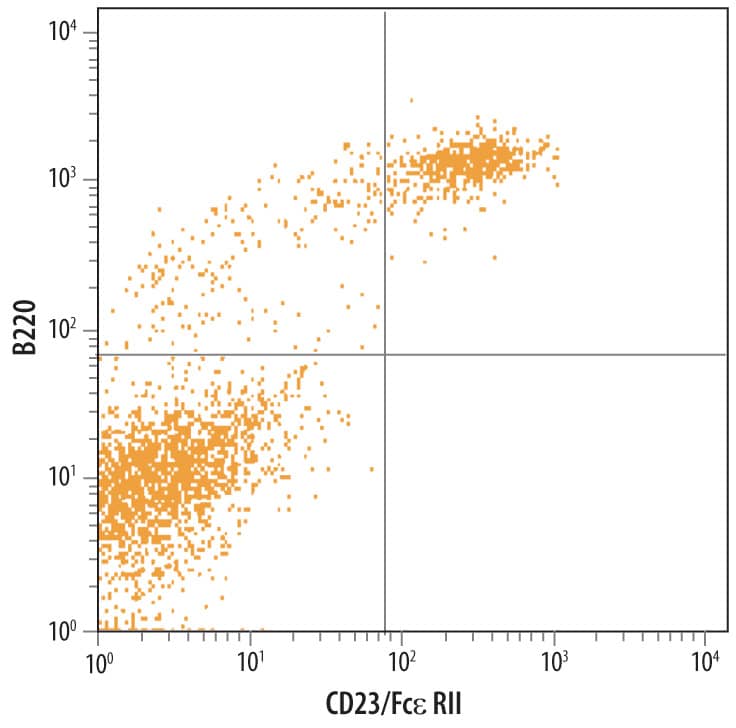Mouse CD23/Fc epsilon RII Antibody
R&D Systems, part of Bio-Techne | Catalog # MAB6900


Key Product Details
Species Reactivity
Applications
Label
Antibody Source
Product Specifications
Immunogen
Glu50-Pro331
Accession # P20693
Specificity
Clonality
Host
Isotype
Scientific Data Images for Mouse CD23/Fc epsilon RII Antibody
Detection of CD23/Fc epsilon RII in Mouse Splenocytes by Flow Cytometry.
Mouse splenocytes were stained with Rat Anti-Mouse CD23/Fce RII Monoclonal Antibody (Catalog # MAB6900) followed by Phycoerythrin-conjugated Anti-Rat IgG Secondary Antibody (Catalog # F0105B) and Rat Anti-Mouse B220/CD45R APC-conjugated Monoclonal Antibody (Catalog # FAB1217A). Quadrant markers were set based on control antibody staining (Catalog # MAB006).Applications for Mouse CD23/Fc epsilon RII Antibody
CyTOF-ready
Flow Cytometry
Sample: Mouse splenocytes
Formulation, Preparation, and Storage
Purification
Reconstitution
Formulation
Shipping
Stability & Storage
- 12 months from date of receipt, -20 to -70 °C as supplied.
- 1 month, 2 to 8 °C under sterile conditions after reconstitution.
- 6 months, -20 to -70 °C under sterile conditions after reconstitution.
Background: CD23/Fc epsilon RII
The low affinity receptor for IgE, Fc epsilon RII (designated CD23) is a member of subgroup II of the C-type (Ca2+-dependent) lectin superfamily (1-4). Mouse CD23 is a
45-49 kDa type II transmembrane glycoprotein that binds mouse, but not human, IgE (1-4). The longest isoform is 331 amino acids (aa) in length and contains a 23 aa cytoplasmic domain, a 26 aa transmembrane segment, and a 282 aa extracellular domain (ECD). The ECD C-type lectin domain binds both protein and carbohydrate, with separate sites for binding IgE, CD21, and beta2 and alphav integrins (2). Coiled-coil topography within a connecting stalk contributes to oligomerization, which increases IgE affinity (1, 2). Mouse CD23 shares 88% aa identity with rat CD23 and up to 57% aa identity with isoforms of human, equine, porcine and bovine CD23. Isoforms which vary in the cytoplasmic sequence include the “a” isoform, which begins with the sequence MEENEYS and is constitutively expressed by B cells, and the “b” isoform, which begins with MDTHHT and is induced by IL-4 on a variety of inflammatory cells, B cells and epithelia (2, 5-7). The isoforms differentially participate in IgE-mediated endocytosis and phagocytosis (2, 8-10). CD23b and two 309 aa mouse CD23b isoforms, lacking either exon 5 or 6, also display distinct endocytic properties on intestinal epithelia (6, 11). Several soluble forms of CD23 are mainly generated by metalloprotease (especially ADAM10) and cysteine protease digestion, although potentially soluble mouse isoforms have also been sequenced (12-14). Both soluble and membrane-bound forms of CD23 include the lectin domain and show bioactivity. CD23 binding to monocyte integrins results in oxidative product generation and proinflammatory cytokine release (15). On human, but not mouse, B cells, sCD23 induces IgE secretion by binding CD21 (2, 9). In both, secreted IgE will bind B cell membrane CD23, rendering it unavailable for cleavage, and thus shutting down IgE production (2).
References
- Kijimoto-Ochiai, S. (2002) Cell. Mol. Life Sci. 59:648.
- Gould, H. and B.J. Sutton (2008) Nat. Rev. Immunol. 8:205.
- Bettler, B. et al. (1989) Proc. Natl. Acad. Sci. USA 86:7566.
- Gollnick, S.O. et al. (1990) J. Immunol. 144:1974.
- Kondo, H. et al. (1994) Int. Arch. Allergy Immunol. 105:38.
- Yu, L.C.H. et al. (2003) Am. J. Physiol. Gastrointest. Liver Physiol. 285:G223.
- Sukumar, S. et al. (2006) J. Immunol. 176:4811.
- Karagiannis, S.N. et al. (2001) Immunology 103:319.
- Aubry, J-P. et al. (1992) Nature 358:505.
- Sarfati, M. and G. Delespeese (1988) J. Immunol. 141:2195.
- Montagnac, G. et al. (2005) Traffic 6:230.
- Weskamp, G. et al. (2006) Nat. Immunol. 7:1293.
- Schulz, O. et al. (1997) Eur. J. Immunol. 27:584.
- Entrez Accession # EDL21949, EDL21951.
- Lecoanet-Henchoz, S. et al. (1995) Immunity 3:119.
Long Name
Alternate Names
Gene Symbol
UniProt
Additional CD23/Fc epsilon RII Products
Product Documents for Mouse CD23/Fc epsilon RII Antibody
Product Specific Notices for Mouse CD23/Fc epsilon RII Antibody
For research use only